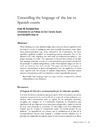Please use this identifier to cite or link to this item:
https://accedacris.ulpgc.es/jspui/handle/10553/58798
| Title: | Unravelling the language of the law in Spanish courts | Authors: | González Ruiz, Víctor M. | UNESCO Clasification: | 57 Lingüística | Keywords: | Lenguaje legal Género legal Interpretación legal Independencia judicial Resoluciones judiciales, et al |
Issue Date: | 2009 | Journal: | Iberica | Abstract: | When deciding on a case, Spanish judges must construe relevant legislation with the help of a body of ambiguous and often mutually inconsistent rules. Apart from general principles (e.g. those collected in the Constitution), the most significant guideline available for interpreting statutes, subsection 3(1) of the Spanish Civil Code, stipulates that rules shall be interpreted according to “the proper meaning of words”. The vagueness of this provision, based on the idea that language conforms to reality in a univocal manner, goes hand in hand with the principle of judicial independence, under which Spanish judges are free to make any decisions they think suitable. This paper describes the principles of statutory interpretation in Spain and emphasizes how the application of these rules, together with the concept of judicial independence, sometimes makes statutory interpretation and court decisions a rather unpredictable process. A la hora de dictar la resolución que pone punto final a un proceso, los jueces españoles interpretan la ley con la ayuda de un corpus de normas ambiguas y, en muchos casos, incoherentes entre sí. Aparte de los principios generales, recogidos por ejemplo en la Constitución Española, la herramienta más significativa de que disponen estos jueces para comprender y aplicar la letra de las leyes está contenida en el artículo 3.1 del Código Civil. Esta disposición estipula que las normas se interpretarán según “el sentido propio de sus palabras”. La vaguedad de este criterio, que se fundamenta en la idea de la correspondencia unívoca entre lenguaje y realidad, coexiste, además, con el principio de independencia judicial, según el cual los jueces españoles son libresde tomar las decisiones que consideren adecuadas. Este artículo describe los principios de interpretación legal vigentes en España, con el objeto de subrayar cómo la aplicación de estos criterios, unida al principio de independencia judicial, convierten la exégesis legislativa y las resoluciones judiciales, en ocasiones, en procesos de resultados imprevisibles. |
URI: | https://accedacris.ulpgc.es/handle/10553/58798 | ISSN: | 1139-7241 | Source: | Ibérica: Revista de la Asociación Europea de Lenguas para Fines Específicos ( AELFE ) [ISSN 1139-7241] (18), p. 93-108 | URL: | http://dialnet.unirioja.es/servlet/articulo?codigo=3185244 |
| Appears in Collections: | Artículos |
Page view(s)
188
checked on Jan 15, 2026
Download(s)
46
checked on Jan 15, 2026
Google ScholarTM
Check
Share
Export metadata
Items in accedaCRIS are protected by copyright, with all rights reserved, unless otherwise indicated.
